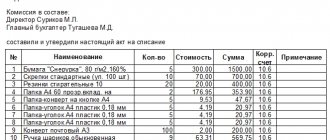Is there a share in the individual entrepreneur?
If you are offered to buy a share in an individual entrepreneur, this is a scam. To formalize the sale of an individual entrepreneur by shares, a limited liability company or a closed joint stock company is created.
An individual entrepreneur is an entrepreneur, an individual. The share of an individual cannot be purchased.
The charter of a registered enterprise specifies the conditions: who owns the controlling stake, how priorities are set in decision-making. The scenario of partnership termination is described - to whom the business will be sold in this case.
Grounds for going to court
Legislation in Art. 235 of the Civil Code of the Russian Federation establishes an exhaustive list of cases in which loss of proprietary rights to property is possible:
- alienation – consists of the voluntary transfer of property to another person (sale, donation, exchange);
- loss in case of death or destruction;
- voluntary renunciation of proprietary rights;
- forced seizure - property is taken from the owner (collection for debts, misuse).
In order to confiscate the owner’s property, legal grounds are necessary, one of which is the forced alienation of part of the apartment by decision of the justice authority established in paragraph 4 of Art. 252 of the Civil Code of the Russian Federation.
This provision assumes that payment of compensation for a small part in an apartment, instead of allocating it in kind, is possible only with the consent of the owner. In this case, the court may oblige the remaining owners to pay compensation, even if the owner of the share is against it.
For the court to make such a decision, a complex of the following factors is necessary:
- The insignificance of the redeemed share is too small (for example, 1/20 of the share in a common home).
- The impossibility of actually separating such a part (the apartment has only one entrance, bathroom, kitchen).
- The owner of such a share has no interest in using it (he lives elsewhere and does not need a home).
Redemption by court decision is possible only if all three circumstances are present.
The Constitutional Court of the Russian Federation has made decisions according to which, when the court considers issues of forced purchase of a part in a home, judges must determine not only the interest of the owner of a small share in its use, but also determine the proportionality of this interest to the inconvenience that such an owner causes to others owners.
https://www.youtube.com/watch?v=ytdevru
Cases of forced purchase of a share in housing fall within the competence of district courts in the territory where the disputed apartment is located.
We invite you to familiarize yourself with how the management company should maintain the local area
To obtain a court decision, you should adhere to the following algorithm of actions:
- Pre-trial procedure - there is no need for this procedure, it is not mandatory. However, an attempt to resolve the issue peacefully can be used in favor of the plaintiff. To do this, you should send a written request to the owner of the insignificant part of the home, indicating your intention to buy out his share. A photocopy of the request will be considered evidence, even if no response is received.
- Determining the value of the redeemed share - it is advisable to contact a specialist appraiser who will draw up an opinion on the price of the redeemed part. The document will also be considered evidence. If the plaintiff wins the case, the cost of the expert’s services can be recovered from the defendant.
- Preparation of documentation - the more evidence the judge receives, the greater the chance for the plaintiff to have a successful outcome of the case.
- Formation of a claim - a statement of claim is drawn up in the prescribed form. To write correctly without typos and errors, it is better to take the help of a professional.
- Submission of a package of documents - papers must be sent to the expedition (office) of the court. This can be done through a personal visit, through a representative or by mail (with notification).
- Litigation – after the documents are accepted, the actual consideration of the case begins. The owners are summoned to the judicial authority and argue their position on the controversial issue.
- Making a decision - after conducting a trial, the court makes a decision in favor of one of the parties. You can appeal it within 10 days.
- Registration of property rights - if the outcome of the proceedings is positive, the plaintiff must transfer to the defendant funds that are equal to the cost of the purchased part of the home. Then you should contact Rosreestr to register the property.
Filing a claim
A claim for forced redemption of a share in a living space must be drawn up in writing and must contain the following information:
- court data;
- information about the applicant;
- information about the defendant;
- cost of claim (price of share);
- amount of duty paid;
- title of the application;
- information about the emergence of proprietary rights for each owner;
- address and characteristics of living space;
- sizes of shares;
- reasons for disagreement;
- expert opinion;
- petition;
- date of writing and signature of the applicant;
- applications.
When filing a claim, the following documents must be attached to it:
- Personal document of the applicant.
- Copies of the application (by the number of participants and for the court).
- A copy of the pre-trial appeal to the defendant.
- Conclusion on the price of housing.
- Certificate from the house management.
- Registration certificate for housing.
- Documents from the Unified State Register of Real Estate on the number of co-owners and the size of shares.
- Duty payment receipt.
- Certificate of other housing of the defendant.
- Receipts for utility bills (solely by the plaintiff).
- Other evidence confirming the plaintiff’s point of view.
What to look for when buying a share
First, decide for what purpose you need the share. Are you considering investing as an active or passive source of income? You need to understand whether you can manage the business if your partner leaves the business or becomes seriously ill.
Decide why you need a share in the business.
The next point is the acquired legal entity. Look how long ago it was registered. If recently, then his history is “clean”. If a legal entity was created a long time ago and then was resold more than once, be sure to order a check of its reliability. Lawyers are looking for data from the moment the company was created:
Check the entire history of the legal entity to ensure its reliability.
- Confirmation of a favorable reputation
- Lawsuits
- Checking the counterparty by sources - closed and open
- Collecting general information on the Internet
- Checking against the register of unreliable suppliers
It is important to evaluate the context, that is, all the nuances of managing a specific enterprise. Let's say that in a family business there may be difficult relationships between the founders. Another example is when co-owners are elderly or one of them passes away. Such situations are problematic from the point of view of wills and distribution of inheritance. This cannot be done without competent lawyers.
In unusual situations, you simply need a lawyer who will secure the transaction and protect your rights!
Remember! Find out who is selling a stake in the company and why. What powers are you given, and will you be able to influence decision making? Purchasing a share differs from purchasing the entire business in that it depends on partners.
Read more about the position of the Supreme Court
The cases that reached the highest court are quite typical for Russian reality. Many people are familiar with the situation when once united and indivisible property begins to fragment, shares are inherited, sold and resold, and as a result, complete strangers find themselves under one roof.
For example, in one of the court cases, long-time owners wanted to buy out shares from strangers who did not actually live in the apartment, but received the shares as a gift after a previous purchase and sale transaction. The first court rejected the claim, the appeal satisfied the claim, but the defendants (owners of the redeemable shares) appealed the decision to the Supreme Court, and it dotted the i’s by supporting the decision of the appellate instance.
In general, the position of the Supreme Court and the established law enforcement practice are as follows:
- Any of the co-owners, in the absence of mutual consent, has the right to demand the division of common property in court. If your common property is not divided, this issue needs to be resolved first. Such a requirement can be included in one claim with other demands, in particular, for the allocation of a share in kind.
- When it comes to the allocation of a share in kind, only the owner of such a share can file such a claim in court. Therefore, if you want to oblige another co-owner to sell you a share, then your initial requirement should be reduced to the requirement to allocate your share in kind. At the same time, the claim must indicate that no agreement on this matter was reached between all owners.
- If the circumstances of the case immediately indicate that the allocation of share(s) in kind is impossible, for example, when it is necessary to divide a one-room apartment, then the question of payment of compensation immediately arises. This sum of money, in fact, should become a buyout of the share or shares of the owners you do not want.
- The Supreme Court pointed out that the issue of forced sale and repurchase of a share(s) can only be raised if a set of conditions are met:
- the owner’s share is insignificant (in the case under consideration it was about 1/6);
- the share cannot be allocated in kind (this is prohibited by law or would cause disproportionate damage to property in common ownership);
- the owner is not particularly interested in using the common property (for example, he does not live in the apartment, has another place of residence, causes damage to property, etc.).
- Demands for the division of common property, the allocation of one’s share in kind and (or) the award of compensation can be raised in one claim. If everything has already been divided and it is only necessary to resolve the issue of redemption of the share, it is permissible to file a demand for recognition of such a share as insignificant, the obligation of the owner to assign it to the plaintiff, and the obligation of the plaintiff to pay compensation. The claim must be justified by the presence of the entire set of conditions specified in paragraph 4.
- A forced purchase of a share in an apartment implemented through a court decision will automatically deprive the owner of the rights to both the share and the common property. The parties do not need to make any transactions. Even if the deprived owner is opposed to receiving compensation, it is enough to put money on deposit in his favor. You can arrange a deposit with a notary, who will then notify the former owner. A court decision and fulfillment of the obligation to pay compensation are sufficient conditions for the re-registration of property rights.
We suggest you familiarize yourself with How to correctly write a complaint about an incomplete stroller
Calculation of share value
The value of a share in a business depends on several parameters. The key aspect is your role in it: whether you buy a controlling stake or not. The company's CEO owns a controlling stake. When voting, he has the power of two votes, while the other shareholders have one vote each.
A controlling stake gives the right to make fateful decisions.
In addition, the cost of the business itself is taken into account. If the LLC has only ten thousand rubles of authorized capital, then buying half of the business will make you the owner of five thousand rubles. It's a worthless deal. Entrepreneurs acquire a share from owners who have behind them equipment, premises, inventory balance - in other words, material support of money. For the buyer, this is a guarantee that after leaving the business he will return the investment.
Make sure the deal is backed by assets: it’s safer.
Two sides of the same coin
The possibility of forced redemption of a share through the court may please some and sadden others. As is typical of Russian reality, in apartment wars any right often becomes abused. However, the cases recently considered by the Supreme Court were only the “first sign”.
If you want to buy out a share or measures are being taken against you to force you to cede a share, today there is no point in going to court without serious legal support. Judicial practice is still too “raw”, decisions of courts of different instances are ambiguous, each case must be analyzed individually.
Share in business as passive income
Passive profit can be received when purchasing a share if the seller is looking for new injections into the business. By contract, he undertakes to pay dividends to the investor. In this situation, the buyer of the share does not directly participate in the conduct of business.
In small business transactions, tax and profitability issues arise. Most likely, the owner will optimize taxes in order to hide the actual profit. Here the investor will not be able to find out what dividends he should actually receive. Therefore, in such a situation, equity participation is a trust arrangement. Or you will have to take an active position in the management and operation of the company.
Passive income is possible only with complete trust in the main owner of the business.
Possible risks when purchasing a share in a business
Remember that you are investing in the assets of the enterprise, its team and manager. It is impossible to make decisions alone; they are always agreed upon with your partner. You can reduce risks by describing the nuances of investment distribution.
The specifics of acquiring a share are well illustrated by an everyday example: buying a room in a communal apartment. You are not free to dispose of the entire area, because you depend on the other neighbors.
But what matters here is who is most responsible for the business. By law, this is the executive decision-making body: the president, board of directors or general.
The board of directors is the executive body that makes decisions in the company
Legislation
The laws of Russia enshrine the principle of inviolability of property throughout the country.
This principle is established in Article 35 of the Constitution. Using this rule, some of the owners, having a small part in the apartment, try to use it as a lever of pressure on the other owners. The actions of the owner of a microshare may consist in completely refusing to sell his part or in setting a disproportionate price for it. However, in some cases, in accordance with the norms of civil legislation, despite the provisions of Article 35 of the Constitution, the owner of a small part in the housing, through the court, will be obliged to sell his property to other co-owners.
https://www.youtube.com/watch?v=ytpressru
The rights of the property owner are established by Article 288 of the Civil Code of the Russian Federation. Based on this norm, the owner can freely use and dispose of his property.
Moreover, quite often one residential property (apartment, house, room) is owned by several people at once. Such property is shared; its concept is prescribed in Article 244 of the Civil Code. Owners of shares can be both relatives and strangers who become owners for one reason or another:
- inheritance;
- division of property;
- acquisition of a share.
If the owners of shares cannot come to an amicable decision on the procedure for using the living space, this procedure, by virtue of Art. 247 of the Civil Code of the Russian Federation can be established by the court. But this is only possible if the parts of the owners' property correspond to individual rooms in the home.
However, it also happens that the part in the apartment of one of the owners is very small, while the largest share belongs to the other owner. In such a situation, it is impossible to establish rules for the joint use of living space even by a court decision, due to the violation of the rights of another by one owner.
Under such circumstances, the main owner offers the owner of a small part to make a buyout, but if it is impossible to reach an agreement on this issue (for example, if the owner of a micro-share refuses or an unfair price is set), the issue can only be resolved in court.
Reasons for selling a stake in a business
- Conflict of interest between owners
- Attracting capital for business development
- Purchase and sale of a company in shares: several investors jointly buy it
- Gradual sale of the enterprise by shares: first, one partner leaves the business, the other remains with the new owner. Then the second one leaves the company
- Need for a partner. For example, a person is an excellent entrepreneur, but has little understanding of the specifics of production. He enters into a partnership with a businessman who understands these processes
Whatever the reasons for selling a share of a business, the main thing is to correctly draw up an agreement, spell out the terms of cooperation and distribute responsibilities. Good luck with your partnership!








